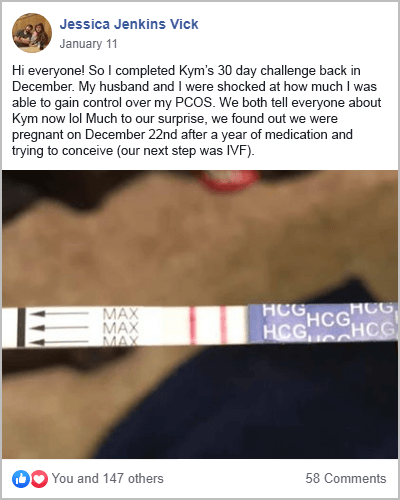PCOS is not technically an autoimmune disease. But that might reflect a failure of the definitions.
PCOS and autoimmune disorders are intricately linked. A new understanding of chronic diseases describes why. It also helps us understand why many of the treatments for PCOS also address autoimmunity.
How PCOS is Associated with Autoimmunity
PCOS has three diagnostic criteria [1]:
- Androgen status
- Menstrual history
- Ovarian appearance
PCOS is primarily considered an endocrine (hormone) disorder.
Autoimmunity is where your immune system produces autoantibodies that attack healthy tissue.
Thyroid disease is an autoimmune illness that affects PCOS women at much higher rates [2]. Estimates suggest these rates may be three or four times higher in women with PCOS than in non-PCOS populations [3].
Recent studies have shown that other autoimmune diseases are also more common in women with PCOS. This includes rheumatoid arthritis, systemic sclerosis, and undifferentiated connective tissue disease [4].
A mechanism explaining this association is also being researched. It’s known, for example, that the typical hormone imbalances associated with PCOS can produce autoantibodies [5-8].
Taken as a whole, researchers are now suggesting that PCOS may cause autoimmune diseases [4].
A New Model of PCOS & Autoimmune Disease
A cutting-edge theory further explains the link between PCOS and autoimmune disease.
The cell danger response (CDR) describes your body’s natural response to danger. It’s what activates immunity. This occurs at a cellular level and is all about mitochondrial function. Under normal circumstances, the CDR is a healthy part of the healing cycle. It’s short-lived. It’s there to help us recover from pathogens and poisons. The CDR is also activated by physical and psychological stressors.
Problems arise when the CDR remains activated for long periods. It can increase the risk of chronic illness. Illnesses like PCOS and autoimmune diseases [9].
The prevalence of many chronic diseases has increased at alarming rates over the past 40 years. Researchers believe that this is being caused by increased exposure to pollution. Toxicants lower the threshold for CDR activation. This then leads to more chronic diseases [10].
How to Treat PCOS & Autoimmune Diseases
The cell danger response explains why PCOS and autoimmune diseases share many treatments. Inflammation is an underlying feature of CDR activation. By reducing inflammatory burdens on our cells, we can dial back the CDR.
For both PCOS and autoimmunity, this means a reduction of symptoms.
Beyond pharmaceutical interventions, there’s a lot that people can do to reduce inflammation.
Dietary change is by far the most effective place to start. For women with PCOS, this means following a PCOS diet. As one would expect, this is identical to a diet developed for hypothyroidism or other autoimmune conditions.
A PCOS diet improves gut health and blood-sugar regulation. Coupled with the avoidance of pro-inflammatory foods, this reduces systemic inflammation.
This is what we do during my free 30-Day PCOS Diet Challenge. The results speak for themselves. For many participants, dietary change is life-changing.
For a sample of suitable recipes, download my free 3-Day PCOS Meal Plan.
Many other lifestyle interventions can also improve PCOS and autoimmune symptomology. These PCOS natural treatments include:
- Taking Ovasitol
- Supplementing with vitamin D for PCOS
- Improving sleep quality
- Exercising regularly
- Actively reducing stress
- Avoiding endocrine-disrupting chemicals
- Minimizing other environmental toxins (especially in drinking water)
The Bottom Line
By its definition, PCOS isn’t an autoimmune disease. But PCOS is associated with autoimmunity. PCOS may even have a causal role in the development of autoimmune diseases. More research is needed.
The cell danger response is a new theory that explains the link between PCOS and autoimmunity. The cell danger response also explains why lifestyle changes that treat PCOS are also helpful for autoimmune diseases.
Doctors can provide pharmaceutical solutions for PCOS and autoimmune conditions. But there’s a lot patients can do themselves to help manage their symptoms. For committed patients, diet and lifestyle changes are all that is needed to take back control of their symptoms.
Author
As a Nutritionist, I’m continuing my mission to help women like you, beat PCOS. Evidence-based diet and lifestyle interventions helped me overcome five years of infertility. I fell pregnant naturally after multiple failed IVF cycles. Along the way, my other PCOS symptoms went away too. This experience taught me how to combine the latest science with a pragmatic approach to habit change. I’ve now helped thousands of other women achieve life-changing results, and I love for you to be the next PCOS success story. Learn more about me and what I do here.
References
1Legro, R.S., et al., Diagnosis and treatment of polycystic ovary syndrome: an Endocrine Society clinical practice guideline. J Clin Endocrinol Metab, 2013. 98(12): p. 4565-92.
2Garelli, S., et al., High prevalence of chronic thyroiditis in patients with polycystic ovary syndrome. European Journal of Obstetrics & Gynecology and Reproductive Biology, 2013. 169(2): p. 248-251.
3Romitti, M., et al., Association between PCOS and autoimmune thyroid disease: a systematic review and meta-analysis. Endocrine Connections, 2018. 7(11): p. 1158-1167.
4Sharmeen, S., et al., Polycystic ovary syndrome: epidemiologic assessment of prevalence of systemic rheumatic and autoimmune diseases. Clin Rheumatol, 2021. 40(12): p. 4837-4843.
5Mobeen, H., N. Afzal, and M. Kashif, Polycystic Ovary Syndrome May Be an Autoimmune Disorder. Scientifica, 2016.
6Arduc, A., et al., High prevalence of Hashimoto’s thyroiditis in patients with polycystic ovary syndrome: does the imbalance between estradiol and progesterone play a role? Endocr Res, 2015. 40(4): p. 204-10.
7Sharma, M., et al., ANTI-THYROID ANTIBODIES AND THE GONADOTROPHINS PROFILE (LH/FSH) IN EUTHYROID POLYCYSTIC OVARIAN SYNDROME WOMEN. Acta Endocrinol (Buchar), 2022. 18(1): p. 79-85.
8Luan, Y.Y., et al., Immune regulation in polycystic ovary syndrome. Clin Chim Acta, 2022. 531: p. 265-272.
9Naviaux, R.K., Metabolic features of the cell danger response. Mitochondrion, 2014. 16: p. 7-17.
10Naviaux, R.K., Perspective: Cell danger response Biology-The new science that connects environmental health with mitochondria and the rising tide of chronic illness. Mitochondrion, 2020. 51: p. 40-45.
As a Nutritionist, I’m continuing my mission to help women like you, beat PCOS. Evidence-based diet and lifestyle interventions helped me overcome five years of infertility. I fell pregnant naturally after multiple failed IVF cycles. Along the way, my other PCOS symptoms went away too. This experience taught me how to combine the latest science with a pragmatic approach to habit change. I’ve now helped thousands of other women achieve life-changing results, and I love for you to be the next PCOS success story. Learn more about me and what I do here.





